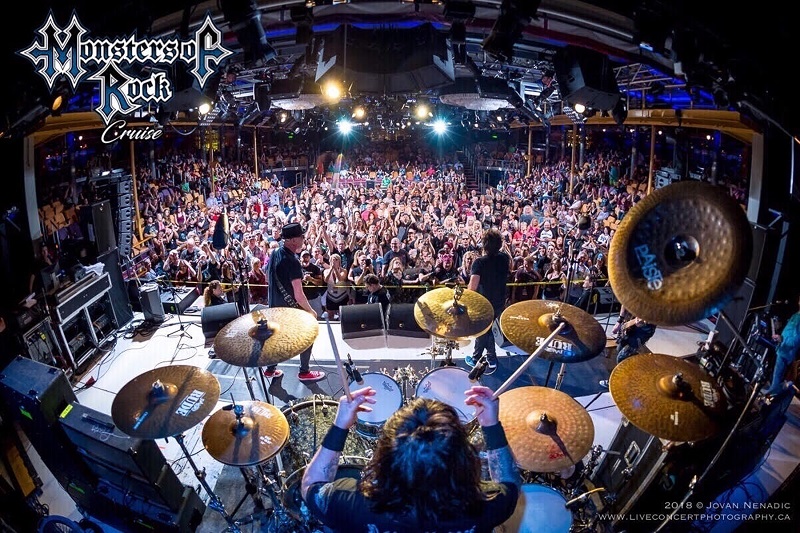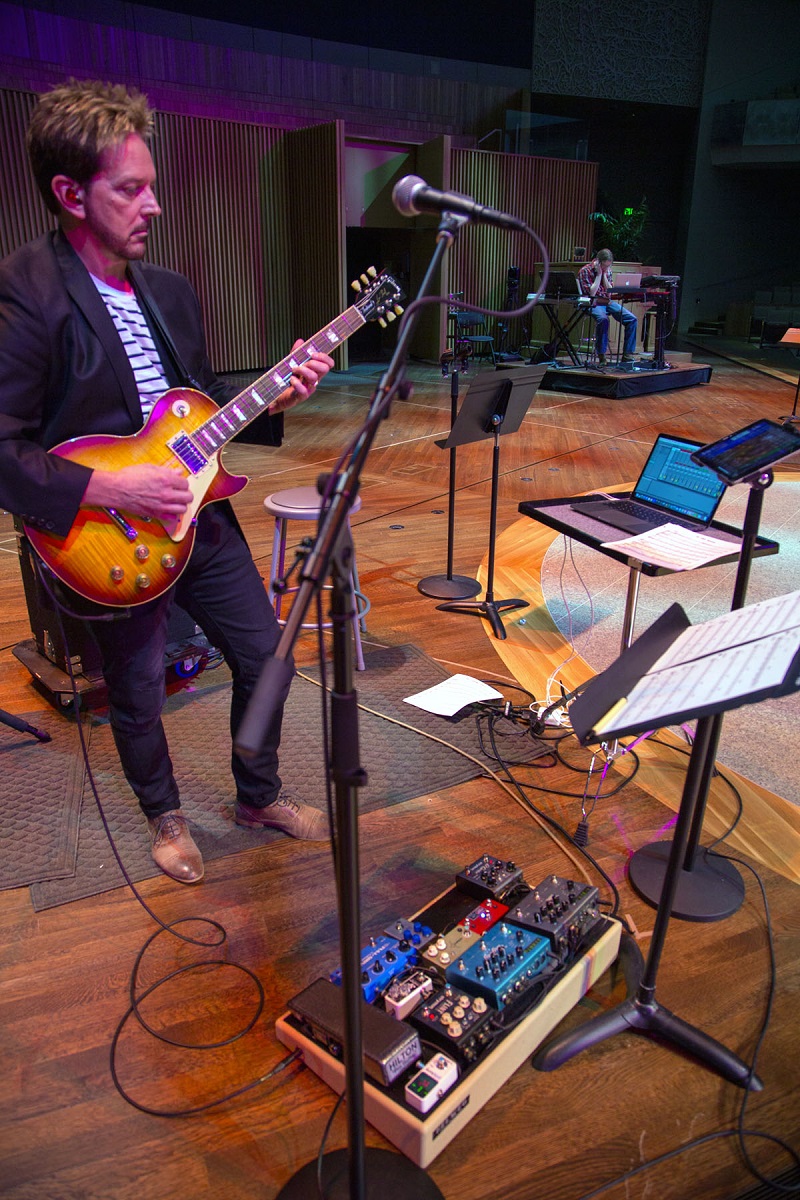Back in February, at Pro Production 2005, a panel of industry experts held court on "Expanding Your Offerings: Becoming A One-Stop Shop." These high priests of sound and light spoke to what it means to offer sound, lighting, effects and staging under a single tent.
The names have not been changed to protect the innocent, but their quotes will not be identified to protect the guilty. (Actually, what Jerry means is that he was working from an audio tape, where it's hard to match a voice in the dark to a name. Next time, we do video. -Ed.) The panel included Gregg Brunclik of Clearwing Productions, Mark Dodd of Dodd Technologies, Doug Adams of Pyrotek and Tom Sorce and Barry Rackover of PRG. If you were there, you know who said what. If not, try to think of them as Masked Super Heroes of the Convergence. Truthtellers, all. Deciding to Offer it All
"We could have chosen to be a much bigger sound company without lights, or a much bigger lighting company without audio. But in our market, the one-stop shop thing just really had to be. We were doing a lot of festivals and college one-offs where a band carrying a limited amount of production just needed the stage, racks and stacks, plus lights or whatever. So for us, it didn't work at all for very long to be just sound."
"Inevitably, the question comes up–do you guys also do lighting? You hear that and then it becomes decision time. If you're going to make the decision to become a one-stop shop, then you have to make sure that whatever you do that's new, you'd better do it right, because it will affect what it was that got you to that level in the first place. If you can't fulfill that in a business sense, then maybe you should stay focused on your particular area of expertise."
The Upside of One-Stop Shopping
The advantages of presenting yourself to clients as a one-stop shop should be obvious–one contact person, one vision and one bill.
"It's the easiest sell in the world if you go to the purchasing people, stage manager or production manager and tell them you're a one-stop shop. You tell them you'd like the opportunity to handle their entire project. Economically, drayage–we do all of the labor, we're in charge of all of the union labor on our jobs, the lifts and the trucking. It's such a big deal. It makes sense."
"Sometimes it's a no-brainer, but sometimes you have to show the economic advantage. When you can consolidate freight cost and package multiple containers with audio, lighting and scenic, and save somebody a $4,000-per-week truck, that's an advantage that shows."
"I spoke to my clients and introduced volume discounts for large corporate events. We pitched a large hotel chain on our ability to turn-key. It was sound, lighting, staging, draping and graphics work-the ability to in-house and carry a cohesive plan end-to-end was a tremendous advantage to us. We can multipurpose the trucking and a lot of the crew members. We really understand the integration, and we were at a substantial price difference between our nearest competitor on that show. The customer realized extraordinary value, and I think we're going to see a substantial gain in market share over that."
Downsides and Growing Pains
Being the point person for a one-stop shop is a 24/7 job. As the saying goes, "It's great to be an entrepreneur–you only work half days. Pick any 12 hours you like."
Even that is probably an understatement. If it's your name on the contracts, you'd better know a lot about all aspects of the job, including the psychology of your clients and employees. It's not just about gear and timetables; it's about dealing with people under pressure. Great people and phone skills as well as technical acumen will define your success or failure.
"Our client base is almost solely people we know well. It's repeat business. I always say it's fine to do a job once, but if you only do it once your longevity's probably in question. Repeat business is the key to staying in business. And repeat business is keyed on relationships."
"Clients ask you for discounts on one side to get the whole job. They'll ask you to throw in the lighting or audio, absolutely."
"The danger when you cross into a second or third market is that your expertise won't carry over as well, so you jeopardize your client relationship. You might be excellent at audio or lighting, but you may only be in the middle of the market in some other discipline. When you bring those two levels together, you can jeopardize the entire client relationship if you screw one side of it up."
How to Grow: Alliances vs. Expansion
How exactly do you go about becoming a one-stop shop once you've decided to take the plunge? First, if you decide to go the "I'm gonna own all the gear" route, get out your checkbook or prepare to kill a new credit card or two. It's not going to be cheap. Buying, maintaining and trucking everything you're likely to find on a rider is not for the faint of financial heart. Even the biggest production companies wind up sub-renting certain systems on a per-need basis. Not every show requires smoke and lasers or LED video effects. But most companies will want to own backline and backup control gear. And don't forget the techs to keep it all up and running.
"Try to stay ahead of the curve by being proactive with the kind of inventory you stock. We were one of the first in our neighborhood to have a line array. We try to buy what we think is going to be the hot product six months from now, not necessarily what we see in the rider now."
For the little guy, this approach may be too daunting, not to mention expensive. The start-up or small local company might prefer to work out strategic alliances with other local companies whose gear complements its own. The advantages to both parties are obvious.
"You have lights and techs, I have sound and techs–let's do this gig under my company name and split the profits."
If this relationship works out well, you can regularly offer full services to your clients. Eventually, you may opt to buy out the other company. Most one-stop shops evolve rather than explode onto the scene.
"Surround yourself with good people. Get advice and work. Make a business plan, get a loan and go regional."
But what if things don't go so well in the beginning? What if the other guys working for you screw up? Apart from deciding whether you can work with them in the future, you've got to own the problem. If you can't fix it on the show, then it's time to eat humble pie in front of the client.
"Address problems head-on and make apologies and corrections immediately. Refund and eat it if you must. Make peace and keep integrity."
In the future, make sure everyone on your crew realizes that the show is their responsibility and that everyone's performance reflects on the entire show. Employees should police subs if they notice things being done that are not up to high standards. Consider presenting a one-page subcontractor contract that discusses expectations concerning professional conduct, including dress and talk, in addition to technical standards.
What if the people you're working with under a blanket name try to snake your gig for themselves by approaching the client? The consensus of the experts is to never work with them again. Strategic alliances have to operate from a level of trust. Tell your partners up front, "This is my gig," or put it all in a contract.
Same goes if the shoe is on the other foot when it's you working under another outfit, especially if you already possess one-stop shop capabilities but are only providing one side for another company.
"When certain companies have an allegiance to someone that they've worked with over the years, they might feel threatened that you might be taking their gig or overstepping your bounds. It doesn't happen too often, but when it does you may even lose your single gig over that."
"One of the downsides of being a full-staff shop is when I try to cultivate nearby companies to let me handle the portion of a job that they don't handle. 'When you guys have a need for lighting, how about if you call me to do the lighting on that?' They get concerned that I will end-run them as a result of having sound as well. In reality, it's just about business. I have no desire to create ill will with anyone else in the industry. People get pretty protective and territorial of anything they do, especially clients."
"This industry is relatively small. Word gets around. If you really expect to have longevity, any sort of relationship that you can continue in the industry and everyone's respect, the rules are pretty clear."
Selling It
So who do you have to reach to sell your one-stop shop?
"When you're into live music–not so much with the touring market, where those relationships are with the production manager-type people–but one tier down, doing regional pick-up stuff, you're dealing with the promoter himself. And he's solely price-motivated."
"The first time, it's a fishing trip. Because you're dealing with people in the bidding process who are not always fully disclosing their intent or their processes. So you may have to sit in those marketing times and really try to figure out what they want to accomplish and what their real goals are. Then you supply a solution. From that point on, relationships are extremely important."
"In my experience, it's a moving target on the production end. Gathering information and doing strategic and tactical planning on the frontside is pretty critical to success. You're trying to determine who is pulling the trigger on a decision, and sometimes you're betting on the wrong horse. That piece of it is partially intuitive, partially experiential and sometimes it's just a crapshoot."
"I try to sell the single point-of-contact philosophy to a lot to people. That they don't have to talk to six different people when they want to discuss the elements of the project. That's one of the key elements of my sales pitch, if you will. That the single point of contact is extremely valuable."
"We do have to educate the clients. They're often unaware of what all you can do, how you can add value and add performance to their show. They like to think it's all their idea. You have to lead them; they don't like to be forced. Probably half the job of selling is education."
Expanding Into Corporate Markets
When it's time to look for jobs in unfamiliar territory, beware running afoul of the Culture Wars, aka Suits vs. Ponytails. It's not just about having the right gear, but the right look as well. "We have a very difficult time breaking the 'rock 'n' roll stigma.' Having been an entertainment or rock 'n' roll company for so long–as much as it's hard to have a good, talented technician base to begin with, it's even harder to have a good, balanced base of guys who can do rock 'n' roll and still know how to put on the polo shirt and look right at a corporate event. You have to look the part, like the people on the stage." Of course, the same holds true for houses of worship and overseas jobs. Cultural sensitivity should not be an afterthought, and crew conduct and appropriate dress counts, especially if your company wants to be invited back.
Weeklong corporate shows make investing in gear for full-service presentations more practical because you're not doing one-nighters. There's less wear and tear on gear, fewer trucking and installation expenses and better daily rates on rentals. Developing the abilities needed to run different types of gigs broadens a company's survival chances when unforeseen events such as 9/11 suddenly change the playing field. "Before 9/11, the industry was healthy. Afterward, we saw an industry-wide collapse of meetings and parties. Insurance has quadrupled due to 9/11 and Rhode Island. Those cowboys have cost us. Smaller companies have been driven out of business."
Pricing It
"There are certain points in the year where cash flow becomes an important part of keeping the wheel turning, and in our scenario, it's usually in the dead of winter-from around Christmas to the first of February or so. During these times, we'll do stuff we wouldn't traditionally do just to try to keep people working. We're going to Montana to do some snowmobile event in the snow with V-DOSCs. Vari*Lites out in the blizzard for a couple weeks, but you do what you gotta do. As we all know, it's people that make this thing go round. We can all own gear, but it's the service that our customers come back for. In order to keep good people on the payroll, you sometimes gotta lower your sights just a little bit. I use an analogy–we don't do puppet shows–but if it were the difference between doing a puppet show this week or laying off somebody, I'd probably do the puppet show and choke it down!"
"You don't want to devalue yourself. Anyone can work for free. At the moment you do that, they're going to want that free the next time. There's never that time when they say, 'Don't worry! Next time, next time.' It never happens. All you're doing is wearing down your own equipment and your own crew."
"There are guys with gear in a truck out behind the barn ready to do a gig. There are guys at all levels ready to compete with you. Show your creativity. Show how you're better than your competitors. Try to do whatever you can to satisfy a client."
"You're trying to find the best balance between the price, quality and the relationship. What your clients want to get is good value for the dollars they put in. They want high performance. They want you to believe in their project and what they want."
So should you walk away from unprofitable shows? Yes, absolutely. But how can you soothe an upset cheapo client? "What we normally do is not strand them. We say, Listen, if you can't afford the service that we do, I have some people you can call. I'll give you my recommendations. I'll give you some place to go. I just can't perform at the price level you want.
The Zen of One-Stop Shopping
Aside from the financial and technological reasons for going one-stop, panel moderator Tom Sorce wrapped up the metaphysics behind it all:
"Offering multiple services in multiple markets gives you the opportunity to challenge yourself and grow in a way you might not have done otherwise. It keeps you creatively engaged and interested in what's going on. Expand your knowledge base and work on larger sets of problems.
"This industry is relatively new and experimental. We're still learning to make it work and push it forward. The one-stop shop concept is relatively new and leading-edge. It keeps you from getting lazy."


